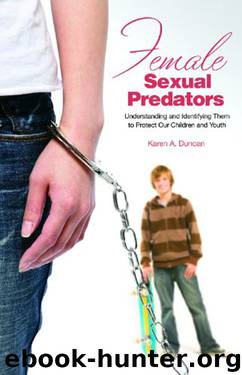Female Sexual Predators: Understanding Them to Protect Our Children and Youths by Karen A. Duncan

Author:Karen A. Duncan [Duncan, Karen A.]
Language: eng
Format: epub
Tags: Forensic Psychology, Child Abuse, Social Science, Female sex offenders, Sex crimes, General, Child sexual abuse, Family & Relationships, Child sex offenders, Psychology, Social Work, Criminology, Abuse, Personality
ISBN: 9780313366291
Publisher: ABC-CLIO
Published: 2010-07-20T04:00:00+00:00
Sexual Exploitation and Sexual Harassment in Schools • 113
may not be willing to tell and adults may not be willing to question, let alone report, this person. It is important to remember that “asking” someone about
his or her behavior or expressing concern for a student’s safety and well-being is not the same as accusing someone of sexual abuse. Speaking with another
adult about their behavior may also provide the opportunity for that person to consider another way of interacting with students and most importantly,
that having this conversation might give the person a reason to pause and
consider seeking professional help to examine their behavior and beliefs and
stop the potential exploitation or abuse of students and prevent future prob-
lems from occurring. Manipulative and deceptive adults can use their posi-
tion of authority, likability, and access to students in order to commit an array of behaviors that, for the purpose of this discussion, are defi ned as educator sexual misconduct .
A REVIEW OF FINDINGS FROM THE U.S. DEPARTMENT
OF EDUCATION (2004) STUDY ON EDUCATOR SEXUAL
MISCONDUCT IN SCHOOLS
In the comprehensive report issued by the U.S. Department of Education
(2004), educator sexual misconduct is defi ned as “any behavior of a sexual
nature which may constitute professional misconduct” (p. 2). 5 Th erefore,
educator s exual misconduct includes sexual crimes against minors as they are defi ned by state laws and behaviors that are outside established laws
but are considered ethically prohibitive because of the inherent relationship between an adult affi
liated with the school and the student attending the
school. Th
is defi nition of sexual misconduct in schools broadens the scope
of the types of sexual misconduct that adults who have access to students
are known to commit. Th
is broader scope of sexual misconduct in schools
includes off ensive behaviors that may not be specifi cally defi ned in state law because a student has reached the age of legal consent but where the adult
continues to take advantage and exploit the student relationship.
It is also important to remember that labels like pedophile and hebephile are not legal terms; rather, they are clinical terms used in the mental health profession that have no bearing on identifying or reporting educators or other adults who commit the various crimes that constitute child sexual abuse. As clarifi ed in the report by the U.S. Department of Education (2004), the sexual disorders of pedophilia (i.e., a sexual disorder characterized by a sexual preference for prepubescent children) and hebephilia (i.e., a sexual preference for adolescents) limit rather than expand the recognition and reporting of the array of motives and sexual behaviors that correlate with educator sexual misconduct
because “not all sexual contact with children is delivered by a pedophile or
Download
This site does not store any files on its server. We only index and link to content provided by other sites. Please contact the content providers to delete copyright contents if any and email us, we'll remove relevant links or contents immediately.
Rewire Your Anxious Brain by Catherine M. Pittman(18643)
Talking to Strangers by Malcolm Gladwell(13347)
The Art of Thinking Clearly by Rolf Dobelli(10454)
Mindhunter: Inside the FBI's Elite Serial Crime Unit by John E. Douglas & Mark Olshaker(9322)
Becoming Supernatural by Dr. Joe Dispenza(8200)
Change Your Questions, Change Your Life by Marilee Adams(7759)
Nudge - Improving Decisions about Health, Wealth, and Happiness by Thaler Sunstein(7692)
The Road Less Traveled by M. Scott Peck(7594)
The Lost Art of Listening by Michael P. Nichols(7494)
Mastermind: How to Think Like Sherlock Holmes by Maria Konnikova(7323)
Enlightenment Now: The Case for Reason, Science, Humanism, and Progress by Steven Pinker(7306)
Win Bigly by Scott Adams(7184)
The Way of Zen by Alan W. Watts(6601)
Daring Greatly by Brene Brown(6502)
Big Magic: Creative Living Beyond Fear by Elizabeth Gilbert(5755)
Grit by Angela Duckworth(5604)
Ego Is the Enemy by Ryan Holiday(5414)
Men In Love by Nancy Friday(5234)
The Laws of Human Nature by Robert Greene(5172)
